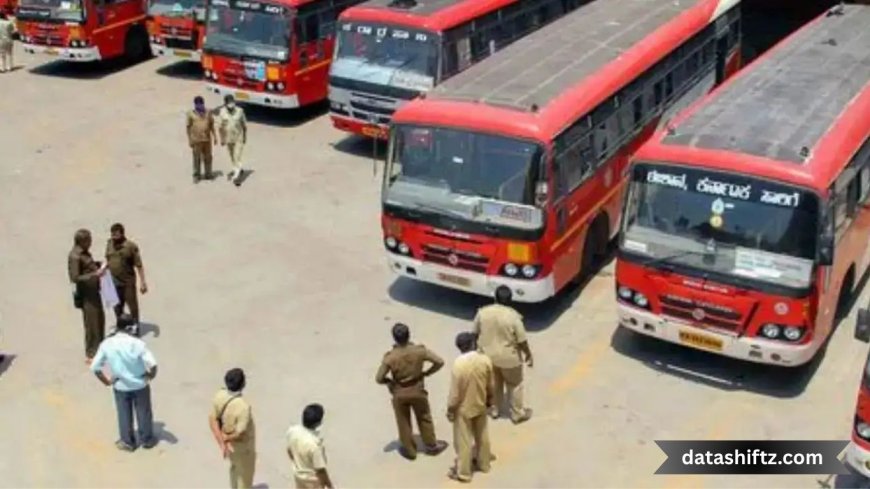KSRTC Bus Strike in Karnataka Today: Major Disruption to Public Transportation

Karnataka’s public transportation system has been brought to a standstill today, August 5, 2025, as employees of the Karnataka State Road Transport Corporation (KSRTC) initiated an indefinite strike. What started as a dispute over outstanding dues and job security has escalated into a full-scale suspension of operations, affecting millions of commuters across the state.
What Happened – The Strike Begins
Trade unions representing KSRTC (including its northeast and northwest divisions), along with BMTC, NWKRTC, and KKRTC employees, commenced the strike early morning, defying a High Court order that temporarily halted the protest until August 5. With negotiations failing to yield results, workers proceeded regardless, citing unpaid salaries and opposition to proposed privatization of services.
The Core Demands:
-
Release of pending wage and dearness allowance arrears
-
Safeguards against the privatisation of public bus routes
-
Assurance of job security and benefits for existing staff
Impact Across Cities
In Bengaluru:
-
KSRTC long‑distance terminals are in chaos, with minimal bus movement.
-
Meanwhile, BMTC services remain functional; authorities have managed to maintain urban routes effectively.
-
Metro trains are heavily overcrowded, as commuters resort to alternate travel methods.
Other Cities:
-
Commuters in Mysuru, Hubballi and other major cities are stranded due to total suspension of KSRTC services.
Government Response:
-
Karnataka government has appealed to private firms to allow work-from-home (WFH) policies for staff in Bengaluru to reduce peak-hour traffic load.
-
They are also exploring alternative private bus operators to fill the gap temporarily.
Summary of Karnataka Bus Strike — August 5, 2025
| Aspect | Details |
|---|---|
| Date | August 5, 2025 |
| Actors Involved | KSRTC, BMTC, NWKRTC, KKRTC employees |
| Reason for Strike | Unpaid salaries, pending dearness allowance, opposition to privatisation |
| High Court Order | Interim stay on strike until Aug 5; unions defied order |
| KSRTC Status | Services largely suspended; long-distance terminals in disarray |
| BMTC Status | Operating with minimal disruption within Bengaluru |
| Metro Status | Overcrowded due to shifting commuters |
| Alternate Measures | Private operators, WFH directives, contingency transport planning |
Issues Driving the Strike
-
Arrears in salaries and allowances: Employees claim months of unpaid dues, including dearness allowance increments.
-
Resistance to privatisation: Workers fear that private operations will compromise wages, rights, and benefits.
-
Failed negotiations: Meetings held on July 28 and August 2, along with talks involving the Chief Minister, ended without resolution.
-
Ignoring court order: Despite a High Court injunction delaying strike action until August 5, employees proceeded with the protest.
What This Means for Commuters and the State
Every day, over 1.1 crore passengers rely on KSRTC and BMTC services across Karnataka. Today, most of those services have come grinding to a halt, grinding daily life across the state.
-
Daily commuters in smaller cities and towns are left stranded without access to KSRTC buses.
-
Bengaluru residents face overcrowded trains, longer queue times, and increased travel stress.
-
Students and workers dependent on public transit are scrambling for alternatives, with ride‑share options stretched thin.
-
The economic impact is mounting: trade, retail, offices, and transit‑dependent services are all feeling the pinch.
What Next?
-
Unions have until August 5 to revisit negotiations, following the High Court’s interim stay.
-
The government has proposed private operators and backup transport alternatives if talks fail.
-
Continued disruptions could prompt invocation of the Essential Services Maintenance Act (ESMA) to prohibit further action, similar to previous events in early July 2025.
-
With negotiations on the horizon, commuters and stakeholders await clarity on whether the monopolized transit system will resume, or if privatization changes will proceed.
Conclusion
Today’s KSRTC strike in Karnataka marks a significant clash between workers and the state government over financial grievances and structural reforms. Despite a temporary court order forbidding immediate shutdown, unions have launched an indefinite strike, leaving millions in limbo. The government’s responses—private operators, WFH advisories, contingency planning—attempt to mitigate fallout, but uncertainty looms. With critical negotiations on deck, all eyes are on whether the strike will de-escalate or escalate further.





























